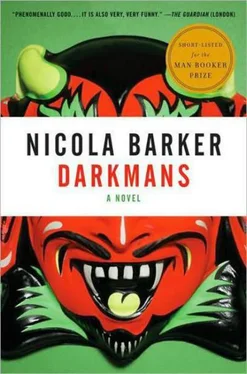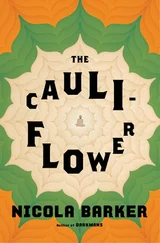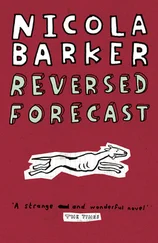For want of a better word
More dangerous (even). They were stealthy. They seemed almost to creep up on him. They had no sense of propriety; were untimely, inexpedient and often socially embarrassing. They never (or very rarely) stood on any kind of ceremony. They were merciless. They were indecorous. They were delinquent .
Previously — and again, this was chiefly relying on the information which Elen had given him — they’d had a much more controllable evolution. They were constant but reliable. Were predictable. Were minimal. Had exhibited an internal logic of some kind.
Now there was something almost cruel, almost…
Vindictive?
Is that too emotional?
Now there were ‘flashpoints’. And the paranoia was terrible. Really terrible. Much more severe than it had ever been ( ever , Elen said). And the denial was absolute. But worse than all of this — worst of all — Dory had become — and this might not seem like much, superficially, but it was actually the most heartbreaking element of the whole thing — he’d become humourless .
He’d lost his ability to just laugh it all off. He was really— really —brought down by it. He was depressed. He kept saying (for example) that he was finding it ‘hard to focus’ (he’d been twice to get his eyes tested over the last six weeks. His eyesight was pronounced perfect, on both occasions).
He was barely sleeping. Insomnia . He’d always been a light sleeper (needed only four good hours, at most — like Margaret Thatcher), but there was no doubt — no doubt whatsoever — that sleep was a major factor in the whole scenario; a ‘trigger’.
Nobody dared use the word ‘narcolepsy’, and certainly not in front of him (he was German . Self-reliance was his watchword — and clarity, and precision). There was a stigma — Dory felt — with this particular condition, because of its inevitable connection with childhood trauma; the underlying sense of an inability to cope. At some fundamental level Dory closely aligned coping with his masculinity (coping was something he needed to do, and do well, to be a successful male).
Isidore’s finer feelings aside, however, narcolepsy was definitely one of the medical conditions which best fitted his particular combination of symptoms. It didn’t fit completely (symptoms could be like that). Elen said it was as though Dory was missing a shoe, and narcolepsy was a slipper (ie they were related, but not entirely compatible). Beede found this description telling. He found it apt.
The other unsayable word was — but of course — schizophrenia. This word made everybody panic (even Elen). But it was not a fearful word for Beede. For Beede it was just a combination of letters which didn’t even feature in his old Pocket Oxford . The closest they came to it there was ‘schist’; a kind of crystalline rock, whose components were arranged in distinct layers. Beede liked that. He’d tried to tell Elen about it (the ‘layers’ ie the concept of something separate but unified), yet for some reason she seemed to gain no palpable sense of relief from the idea.
Of course Isidore had been medicated for his condition in the past — so far as it was possible (which wasn’t very far at all), because every doctor he visited seemed to have a different opinion (and these medical practitioners were few and far between). Dory hated doctors — found them ‘meddlesome’—flew into a blind panic at the idea of ‘a diagnosis’. To be diagnosed was to be boxed up, to be compartmentalised, to be made separate, to be lost. For Dory a diagnosis represented ‘the death of hope’. His optimism — and he was optimistic, by and large — thrived in unknowing.
There were some things (some symptoms — side-effects, you might say) which Dory simply wouldn’t factor in during medical consultations (refused to, point-blank, Elen said), and this obviously made it very difficult for any kind of practitioner to complete their medical assessment of him. He could be extremely secretive (for such an extraordinarily ‘open’ person), as if protecting something precious — something vulnerable — inside of him.
And like nearly all people with serious long-term medical conditions, Dory associated medication— being medicated — with a lot of the bad stuff from his past (things from his childhood which he’d never openly discuss: his mother was over-protective, his father very controlling, the usual stuff). So he was heavily resistant to any kind of ‘help’ (medical, analytical), which obviously made things incredibly difficult…
‘ Damn!’
Beede suddenly (and unexpectedly) ground to a halt. He put a hand to his chest and drew a deep breath (he was surprisingly short of puff). As he exhaled, he quickly checked his watch. He cursed again. Dory — who was at least ten paces ahead (not even a vague sheen of sweat on him; he was fit as a cheetah) — heard the horse come to a stop. He turned, quick as a flash. ‘Beede? Something wrong?’
Beede glanced up, almost guiltily. ‘No. Nothing. Just a meeting…’ he shrugged, ‘I’m late. In fact I’ve already missed her. I completely forgot…’
‘A meeting at work?’
‘No…’ Beede shook his head. ‘Not at work.’
‘At home ?’
Dory looked flabbergasted (this was for comic effect, Beede presumed).
‘Yes, Dory, at home.’
Beede crisply enunciated his response to try and railroad any potential ribbing. It wasn’t a successful ploy.
‘A personal arrangement?’
Still, Dory maintained his little act.
Beede found himself blushing. He had no idea why. He said nothing.
Dory’s eyes flew even wider. ‘ What? Beede — Mr Daniel Beede — actually socialising ?!’
Beede’s flushed but sombre face cracked into a smile (Ah yes. This was the real Dory. The real him. He could be tender yet mocking, could needle you in that special, gentle way of his which even the most ferocious curmudgeon would do well to take umbrage at).
‘A date ?’ Dory rapidly expanded on his theme, his blue eyes twinkling. ‘An assignation ?’
‘Yes. No ,’ Beede scowled. ‘I didn’t…It’s just some…’
He started to walk again, then stumbled, slightly, on the narrow pavement ‘…some insignificant person ,’ he finished off, clumsily.
Dory seemed utterly delighted by Beede’s coy evasiveness. ‘Well perhaps you might ring her?’
He slipped his hand into his jacket pocket, then grimaced, and tried his other. Nothing.
‘We need to cross before we reach the fly-over.’ Beede quickly changed the subject, staring first down the road, then up it. He started off (firmly grasping his trousers) at a slow trot. Isidore glanced left himself, then followed.
They reached the other side (Beede now a little ahead) and walked rapidly onward. But after only a few moments, Beede abruptly stopped for a second time. Isidore found himself hard-up against the horse’s rump. He took a quick step back. They were standing at the near-end of the fly-over. Cars and lorries were roaring past. Isidore frowned, glanced behind him, saw a small gap in the traffic and took his chance. He speedily overtook the horse.
Beede was staring down over the embankment to his left and frowning. He seemed deeply preoccupied. A large field lay ahead of them — a semi-circular meadow, full of bleached grass, young trees (huddled inside their protective, plastic sheaths) and a muddle of bushes. They were almost at the point where the road they were taking divided into three separate parts: one section charging boldly onwards, the other two curving sharply off and around to form the different sides (the valves, the ventricles) of a divided heart (or — in the pursuit of absolute anatomical accuracy — the two segregated cheeks of a pair of buttocks). Snuggled into the hinterland of that voluptuous curving were two good-sized plots. The one on their particular side currently contained a thin sprinkling of mixed livestock.
Читать дальше
Конец ознакомительного отрывка
Купить книгу












